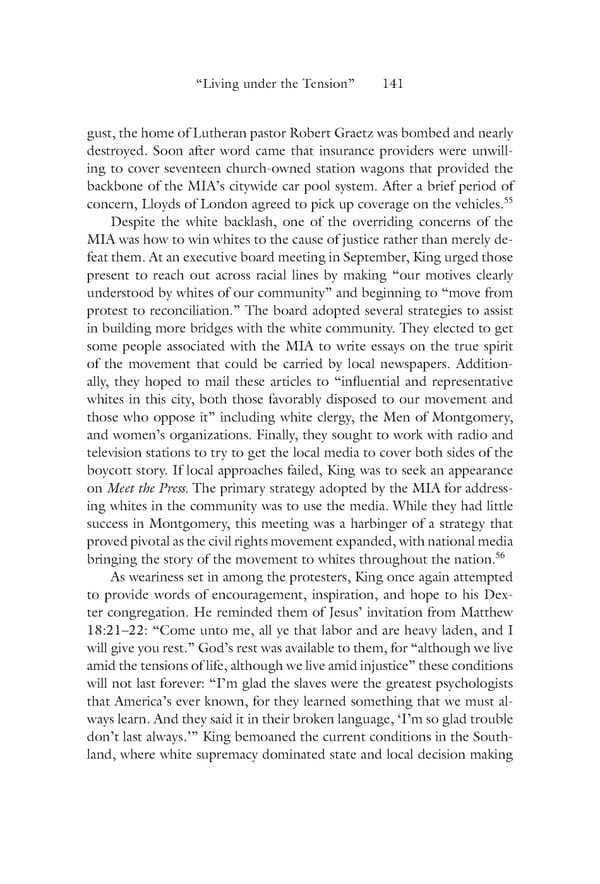“Living under the Tension” 141 gust, the home of Lutheran pastor Robert Graetz was bombed and nearly destroyed. Soon after word came that insurance providers were unwill- ing to cover seventeen church-owned station wagons that provided the backbone of the MIA’s citywide car pool system. After a brief period of 55 concern, Lloyds of London agreed to pick up coverage on the vehicles. Despite the white backlash, one of the overriding concerns of the MIA was how to win whites to the cause of justice rather than merely de- feat them. At an executive board meeting in September, King urged those present to reach out across racial lines by making “our motives clearly understood by whites of our community” and beginning to “move from protest to reconciliation.” The board adopted several strategies to assist in building more bridges with the white community. They elected to get some people associated with the MIA to write essays on the true spirit of the movement that could be carried by local newspapers. Addition- ally, they hoped to mail these articles to “influential and representative whites in this city, both those favorably disposed to our movement and those who oppose it” including white clergy, the Men of Montgomery, and women’s organizations. Finally, they sought to work with radio and television stations to try to get the local media to cover both sides of the boycott story. If local approaches failed, King was to seek an appearance on Meet the Press. The primary strategy adopted by the MIA for address- ing whites in the community was to use the media. While they had little success in Montgomery, this meeting was a harbinger of a strategy that proved pivotal as the civil rights movement expanded, with national media 56 bringing the story of the movement to whites throughout the nation. As weariness set in among the protesters, King once again attempted to provide words of encouragement, inspiration, and hope to his Dex- ter congregation. He reminded them of Jesus’ invitation from Matthew 18:21–22: “Come unto me, all ye that labor and are heavy laden, and I will give you rest.” God’s rest was available to them, for “although we live amid the tensions of life, although we live amid injustice” these conditions will not last forever: “I’m glad the slaves were the greatest psychologists that America’s ever known, for they learned something that we must al- ways learn. And they said it in their broken language, ‘I’m so glad trouble don’t last always.’” King bemoaned the current conditions in the South- land, where white supremacy dominated state and local decision making
 Becoming King: Martin Luther King Jr. Page 161 Page 163
Becoming King: Martin Luther King Jr. Page 161 Page 163